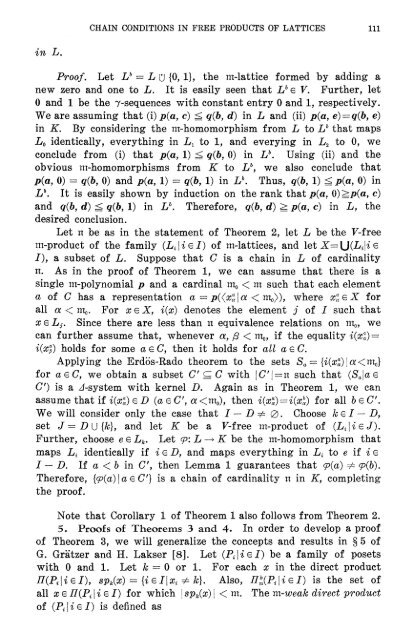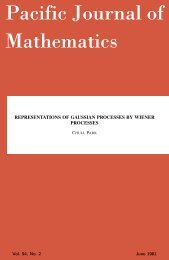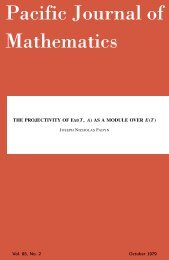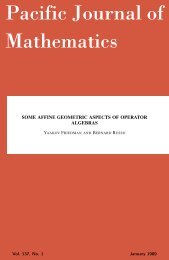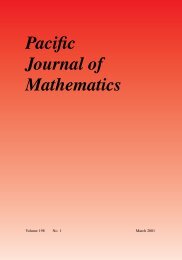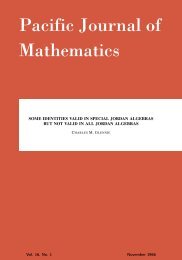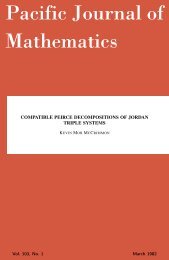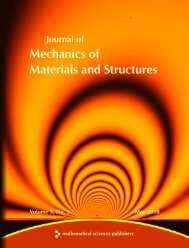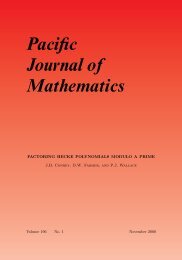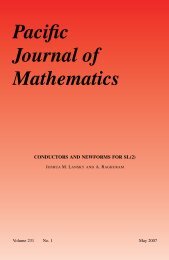Chain conditions in free products of lattices with infinitary ... - MSP
Chain conditions in free products of lattices with infinitary ... - MSP
Chain conditions in free products of lattices with infinitary ... - MSP
You also want an ePaper? Increase the reach of your titles
YUMPU automatically turns print PDFs into web optimized ePapers that Google loves.
<strong>in</strong> L.<br />
CHAIN CONDITIONS IN FREE PRODUCTS OF LATTICES 111<br />
Pro<strong>of</strong>. Let L b = L U {0, 1}, the tn-lattice formed by add<strong>in</strong>g a<br />
new zero and one to L. It is easily seen that L b e V. Further, let<br />
0 and 1 be the 7-sequences <strong>with</strong> constant entry 0 and 1, respectively.<br />
We are assum<strong>in</strong>g that (i) p(a, c) g q(b, d) <strong>in</strong> L and (ii) p(a, e) = q(b, e)<br />
<strong>in</strong> K. By consider<strong>in</strong>g the m-homomorphism from L to L b that maps<br />
I/ o identically, everyth<strong>in</strong>g <strong>in</strong> Lx to 1, and every<strong>in</strong>g <strong>in</strong> L2 to 0, we<br />
conclude from (i) that p(a, 1) (α, 0)^p(α, c)<br />
and g(6, d) ^ g(6, 1) <strong>in</strong> I, 6<br />
.<br />
desired conclusion.<br />
Therefore, q(b, d) ^ />(α, c) <strong>in</strong> L, the<br />
Let it be as <strong>in</strong> the statement <strong>of</strong> Theorem 2, let L be the F-<strong>free</strong><br />
m-product <strong>of</strong> the family (Lt\ίel) <strong>of</strong> nx-<strong>lattices</strong>, and let X=\J(Li\ie<br />
/), a subset <strong>of</strong> L. Suppose that C is a cha<strong>in</strong> <strong>in</strong> L <strong>of</strong> card<strong>in</strong>ality<br />
tt. As <strong>in</strong> the pro<strong>of</strong> <strong>of</strong> Theorem 1, we can assume that there is a<br />
s<strong>in</strong>gle m-polynomial p and a card<strong>in</strong>al m0 < rπ such that each element<br />
a <strong>of</strong> C has a representation α = p({xl\a < mo», where tfel for<br />
all a < m0. For x e X, i(x) denotes the element j <strong>of</strong> I such that<br />
xeLd. S<strong>in</strong>ce there are less than n equivalence relations on m0, we<br />
can further assume that, whenever a, β < nt0, if the equality i(x%) =<br />
i(xf) holds for some aeC, then it holds for all aeC.<br />
Apply<strong>in</strong>g the Erdos-Rado theorem to the sets Sa = {i(Xa)\oc


